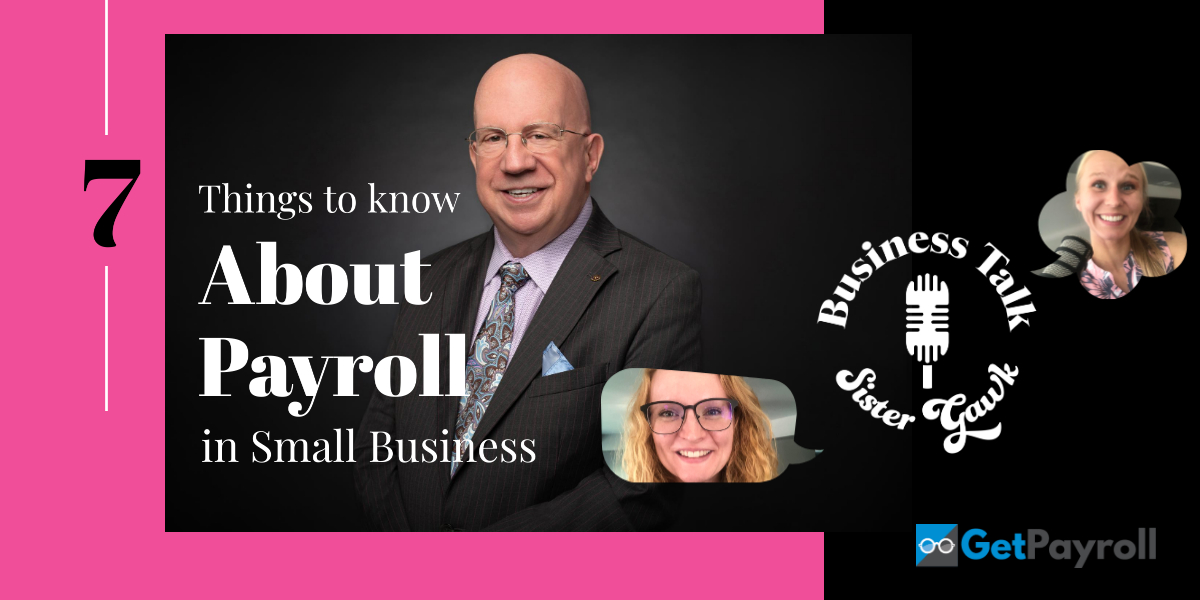This week we interview entrepreneur, Charles Read, about payroll! You will fall in love with how entertaining this IRS business advisory board member makes payroll and business taxes sound! Such a delight to soak in his knowledge.
Welcome to Business Talk Sister Gawk! I’m Bekkah! And I’m Ruthie! And today we are super excited for this episode because we get to interview somebody who we have just enjoyed getting to know. Our topic is 7 Things You Need to Know About Payroll in Small Business! We have with us Charles Reed! Thank you so much for being here with us today!
Charles: Ladies, my pleasure!
Ruthie: *giggles* Awesome!
Bekkah: Our first question for you is what do you do?
Charles: I run a payroll company and what a payroll company does is we provide payroll and associated services to mostly small businesses around the country. We take the hours that people work in their salaries, we create their checks or direct deposits. Then for the employer we pay all the taxes, deposit them all with the government entities, fill out all the forms, send them in, and when the IRS or the state makes a mistake we fix it.
Ruthie: Wow! Very versatile! You’ve got all kinds of stuff that you’re working on yeah!
Charles: Yeah!
Why Did You Start A Payroll Business?
Ruthie: Awesome! Why did you start doing that? What was your why behind why you got started in payroll?
Charles: Well, I had worked in business for a number of years after college and I got to a point where I realized I was never going to run a major corporation because I didn’t have the political skills. I was unwilling to stab people in the back and throw them off the ladder.
*Bekkah and Ruthie laugh*
Bekkah: I’m sorry –
Charles: If I was gonna – yes that’s all right! *Charles laughs* If I was gonna run a business like I wanted to, and I grew up in a family business, I was going to have to start my own. So my wife and I started our own business. I bought a franchise accounting service that had a payroll service bureau built in. The franchisor went belly up and we just kept going, Ruth and I, and a few years ago I sold off the accounting portion to my partner and I kept the payroll, because I like it! I enjoy doing payroll! I enjoy dealing with businesses. I enjoy the complexity of the IRS and the states and it’s fun so I keep doing it!
Bekkah: Okay so I want to go back a little bit further to a little more into the “how you got there,” because I feel like we’ve missed like years and years of information! Because I’m pretty sure, aren’t you a veteran too? How does that roll into everything?
Charles: Well, I got out of high school at 16. I’d skipped a year and I was young and I went to work and my mother made me pay room and board.
Bekkah: Wow!
Charles: I didn’t want to go to college – it was $20 a week I mean, you know, it was no big deal, but if I was going to work, I had to pay for the room and board. About I turned 17 and I got to the point where I didn’t want to go to college. I wasn’t ready for it. I wasn’t near mature enough so I joined the Marine Corps for four years, served in the Marine Corps. I was trained as a computer programmer and systems engineer but I also did a tour in Vietnam as a combat infantryman. I came back to the United States, was stationed in Kansas City, and met my wife, Ruth. She had five children when I met her and I married her. We were married for 45 years before she passed.
Then I got out of service and realized that without a degree at that point it was very hard to take my skills and put them to work. In the summer of ’74 I started college and in December of ’76 I had my master’s degree. I sat for and passed my CPA exam at the same time. Went to work for Texas Instruments and the rest is history!
Ruthie: Like the calculator company, Texas Instruments?
Charles: There is a lot more than that but yeah. It’s the calculator company!
Bekkah: I just know they make calculators!
Charles: Jerry Junkins would just roll over in his grave if he heard you say that!
Ruthie: Okay! Wow, you’ve had a very full life! That’s so cool!
Charles: I have and I’ve worked for big businesses and small businesses in all kinds of industries and had a lot of fun doing it! It’s been fun and interesting but I realized this morning, I was talking to somebody, the wisdom we get when we get older isn’t because we get smarter. It’s just because we go through enough things and figure out all the things not to do and all the mistakes we make and that makes us seem to be wise to younger people. Because, yeah, I’ve tried that and it failed so don’t try it!
Ruthie: Yeah that’s wisdom for you! Trial and error at its finest!
Charles: I think that’s the only way we learned!
Ruthie: Yeah that’s a good transition into kind of what the topic of payroll there because you kind of found what you liked with all the trial and error that you’ve done in your life and all the things that you’ve experienced. We’ll just jump into some questions that we had here the first one of our seven things you need to know about payroll is what are some common mistakes people make with payroll?
1. The Entity You Choose Determines How Payroll Is Run
Charles: Well, you have to be careful about the entity you choose, because that determines how your payrolls run. If you’re a sole proprietor, you’re never an employee. If you’re a corporation and work in it you’re always an employee, so the choice of entity makes a difference. Then that determines whether you’re going to be a W-2 employee then you have to decide the people that work for you whether they’re independent contractors or employees.
2. Paying Someone on a 1099 When They Should Be an Employee Will Get You Into Trouble
That’s a complex question with a lot of variations to make that determination, but you don’t get to choose. There are laws and rules and regulations and you know if somebody says, “Well, just pay me as a 1099er!” You may or may not be able to do that, and if you can’t, and you do! Then you’re going to get into trouble with the IRS and the State and it’ll be very expensive.
3. You Need to Keep Up to Date With Your Withholdings
You need all your reporting requirements, all your deposit requirements, everything you have to do to keep up with those taxes that you’re withholding.
4. Know The IRS Does Make Mistakes
You have to know that the IRS makes mistakes. The IRS is a hundred thousand people of which 40% are able to retire within the next two years.
Bekkah: What!?
Charles: Yeah, so they’ve been there a while!
Ruthie: Wow!!
Charles: And they’re short of people and they have part of their computers and technical stuff go back to the 1960s. Literally. They have old 1960s style mainframes they still use. Okay, then if you get penalized and you ask for an abatement you keep asking, you keep asking, you keep asking. You go to level, after level, after level. You never give up until the very bitter end. Okay? Because a lot of times it’s a whole series of “no’s” followed by a single “yes”. When that one person says, “Yeah, we’ll abate it.” Say “thank you” and leave!
5. Know: What Is a Tax Abatement?
Bekkah: Let’s back up. What’s an abatement?
Charles: Okay, an abatement is when you get a penalty reversed. The IRS says, “We’re going to penalize you $800 because you were late.” and you weren’t! But they recorded it as late. So you ask for what’s called an “abatement” which is a reversal of the penalty. You give them the reasons why and you explain it. Because this is my last point I was going to give you but I’ll give it to you now, the IRS cannot penalize you for a simple mistake! Though they will try to! They can only penalize you for gross negligence, but guess who gets to define gross negligence? The IRS! So you fight it!
Bekkah: Wow! That’s such a gray area!
6. If You’re Not Aware of The Law as a Business, The IRS Considers It Gross Negligence
Charles: It is! Well, not to them! To them, everything is gross negligence and in some cases, the only way you can win is to go to court and get the judge to agree, “Yeah, that’s just a simple mistake you can’t penalize them for it.”
7. Your Business Needs to Have an Employee Handbook or The Tax Court Doesn’t Care
You can do that! That’s what tax court’s for because I’m a U.S. tax court practitioner. That’s where I take my client’s problems and then the last one was – if you’re in business you need to have a handbook if you have an employee, even if you only have one. Because that’s not only for your protection it’s for their protection.
It’s for everybody to know what their responsibilities and authorities are and what are the penalties if you screw up. If you have that you can make them stick. If you don’t have them the state’s basically going to not care about you. They’re just going to take your employee’s position and they’re not going to care about you as an employer. They’re not your friend they’re your employee’s friend.
Ruthie: Good to know!
Charles: So there’s seven and a half things you need to know about payroll.
Ruthie: Oh, wow! Okay!
What is the Difference Between an Owners Draw and Being Paid as an Employee?
Bekkah: So what’s the difference between owners draws and being paid as an employee of your own company? Is it something big, or just the documentation aspect?
Charles: No!
Bekkah: Okay!
Charles: If you take a draw from your company, a distribution, it is taxable for income tax purposes, but not for employment tax purposes. You as the employer pay 15.3% on your own W-2 earnings; 7.65% comes out of it and the employer pays another 7.65%. If you take it as a draw you don’t pay that so in many cases it’s much more profitable to be able to take distributions or dividends, but even if you’re an S Corp. A rule of thumb in my practice is half of your earnings as distributions and half as W-2 earnings.
If you take it all as distributions the IRS can come back in and re-characterize those as W-2 earnings and penalize you for the late deposits and the late filings and interest and so on and so forth. Be careful, don’t take all distributions, but you can take some if you are in a corporation or in a situation where you are actually an employee but an owner. You can do both.
Ruthie: Okay in which business structure do you have to pay yourself as a W-2 employee.
Charles: If you’re a corporation, if you’re an LLC that files as a corporation, then you have to pay yourself as an employee if you work in the business. In a partnership or a sole proprietor you can’t be an employee. But you’re also taxed for self-employment on the total profits of the sole proprietorship or your share of the partnership. And you can’t avoid that. That’s on page two of your 1040.
Ruthie: Look at you! You even know the page numbers! *all laugh*
Charles: Well, when you’ve done as many as I have you’ll know them too!
Ruthie: I suppose! When people ask questions about taxes and things I usually just say, “Well, did you Google it?” That’s good to know! The next question we had was what is the point at which you should consider hiring an employee because it makes financial sense to do so?
What Is the Difference Between Hiring an Employee or a Contractor in Your Business?
Charles: Well, the difference between hiring an employee and hiring a contractor is a definition of what they do, how they do it, what their responsibilities are, and so on. As far as just hiring somebody in, when it makes economic sense to hire people hire them! Now in many cases, you can hire for certain things. You can outsource things to another company and they’re not an independent contractor. They’re just a contract with another company and that’s not payroll and it’s not 1099. It’s just vendor payments. It’s accounts payable.
Bekkah: I’m going to ask a question on that. If that’s an accounts payable for hiring under a contract with another business, is it because they have an actual legitimate business and they’re not basically a sole proprietor? Is that the difference?
Charles: If they’re a legitimate business, be it sole proprietor or not, they’re responsible for their payroll, their independent contractors, their tax filings, and their tax deposits. You’re not.
Bekkah: Okay.
Charles: Okay, but they need to have a company. They need to have an EIN. They need to have all those accoutrements of a business. It can’t just be a guy saying, “Oh, I’m in business! Yeah, just just write a check to you know Joe Blow Inc.” Well, if Joe Blow Inc doesn’t exist then you have problems. They have to be a legitimate business.
Bekkah: Which is why you always want their tax info!
Charles: Absolutely, you have them fill out that W9 which is the form. They’ll give you their EIN and if they give you a social security number you need to talk to them.
Ruthie: So the EIN, employer identification number, if you are a sole proprietor and you are a subcontractor to someone else how do you know what your EIN is?
Charles: Because you’ve filled out an SS-4 and sent it to the IRS and gotten it.
Bekkah: It’s when you file your business.
Charles: If you haven’t filed your SS-4, you haven’t gotten your EIN.
Bekkah: Okay, I have a sub another sub-question, I know I cut you off. I’m sorry. Under the “when it makes financial sense to hire an employee” is there kind of like a – and I was just thinking originally when we thought about this question – if you’re doing all the work yourself and then you think, “Okay, now I think I should hire an employee but I don’t know what an hourly wage should be and what percentage of that actually goes to them versus the government.” Does that make sense? Is it like an actual employable wage?
How to Know What Taxes You Have to Pay for Hiring an Employee
Charles: Well, when you hire somebody, you have to have several things. You have to pay minimum wage. Once you have an employee, whether you or somebody else, you have to be set up with the state for state tax withholding and state unemployment. They’ll send you out booklets and tell you what the minimum wage is and what you have to pay, how much you have to withhold for state taxes, how much you have to pay for unemployment insurance because that’s solely on the employer. Then the IRS when you file your SS-4 and get your EIN will suggest that you get a Pub 15. A Publication 15, which is the basic payroll, tax guide from the IRS.
It shows you all the things you have to do. The forms you have to do and how much you have to withhold based on how much you pay that person and the W-4 that they fill out. Because every employee you hire needs to fill out – has to fill out! A W-4 and an I-9. The W-4 will tell you what their status is for withholding purposes. How much of their pay you have to withhold. There are tables in the Publication 15 that will show you exactly how much you have to withhold based on the amount of money and the pay periods and so on. The I-9 is to prove that they can legally work in the United States.
Ruthie: Wow! Okay! So it sounds like the Pub 15 is really helpful to guide you through a lot of those things.
Charles: It’s very helpful for that and it’s a very good cure for insomnia.*all laugh*
Ruthie: Good to know! I’ll make sure to pick up one of those next time I can’t sleep!
Charles: You got it! You can Google it!
Ruthie: Okay! Good! That’s helpful! Okay, you kind of talked about like the Pub 15 and how that lists out a lot of things that are necessary, but specifically with running payroll, what is necessary to make sure that you’re running payroll correctly for an employee?
Charles: Well, the first thing to do is you have to collect time correctly, the time they work. Because you have to pay them for all the time that you allow them to work. If you set the hours from 8-4 and they work till 4:30 you got to pay them until 4 30. You don’t get to cut them off when you told them to leave. If they stay around and continue to work, you have to pay them. You have to collect all the time. Then you have to do the calculations. Then you have to start doing the withholdings.
You’ll have taxed withholdings. Then you may have other deductions. They may have a deduction for – they may have a garnishment, they may have a student loan garnishment. They may have child support they have to pay that you’ve been served an order by the court saying you have to withhold that and submit that to the court. You’ve got their earnings, you’ve calculated that, you have all the deductions, you have all the taxes, and then you have to create a check or a direct deposit and get that to them so they’re paid on a timely basis.
Then you have to report all of that and make all your deposits and file all your forms for all the government entities. It’ll be the IRS, the State Revenue Department, the State Unemployment Department, in some states a Local Tax Department as well.
Resources to Navigate Payroll for Your Business
Bekkah: I’m sorry. This is just! I have so many more questions but a good thing that I’m really excited about is – we had a couple more but I know we’re running out of time. If you are just blown away by how great Charles Read is, you should know that he also has a book out right now and you should tell us a little bit about that because we want to make sure that we have that as a resource that we link to on our blog.
Charles: All the answers that I have given you and many, many more are in my new book “The Payroll Book: A Guide for Small Business and Startups”!
Bekkah: I already added it to my Amazon registry. I was like, “Yup! I need this.”
Charles: It’s 30 years of running a payroll service bureau distilled down to 85,000 words and all the questions you’ve asked are in there in detail and many, many many more. It was two years of work for me. It was kind of a labor of love and a pain in the keister and everything else but we got it done! It’s it’s it’s published by Wiley and Sons! It’s available on Amazon, Barnes and Noble, and other fine book stores, or you can order it from us at thepayrollbook.com!
Ruthie: That’s awesome! That’s so cool! Well, thank you so much for joining us today, Charles it was such a pleasure to get to chat with you and learn from you. It’s rare that you can find someone who is both in engaging and just so incredibly knowledgeable when it comes to taxes! *all laugh*
Charles: Yeah! They tend to be mutually exclusive, don’t they?
If you enjoyed this episode, give us a review on Apple podcasts!




